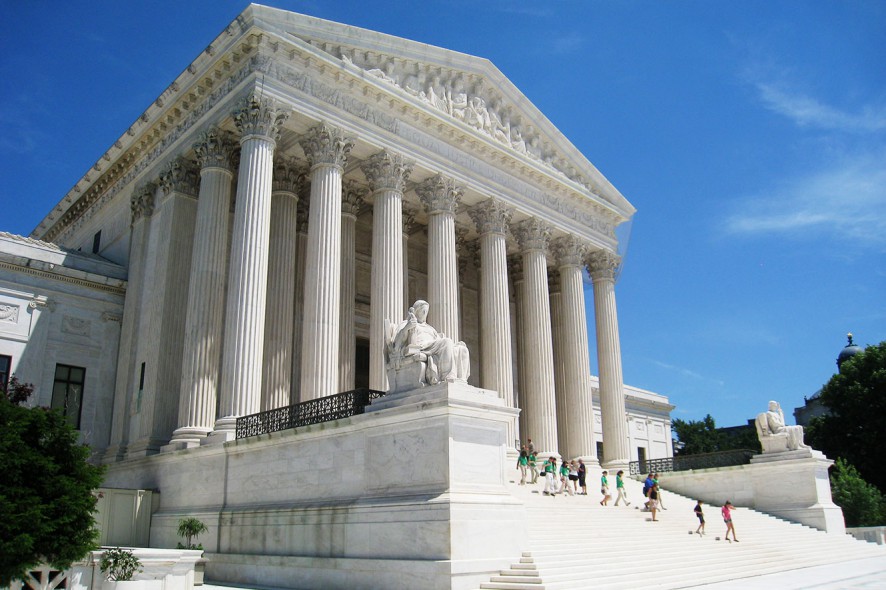Supreme Court of the United States (SCOTUS): While deciding upon the application for stay presented in relation to Alabama Secretary of State’s decision to ban curbside voting despite the ongoing COVID–19 crisis and the willingness of certain Alabama counties to assist voters with disabilities, the Court with a ratio of 5:3 allowed the application thereby allowing Alabama election officials to put a ban on curbside voting. The Court thus put a stay on a Federal District Court order which had lifted the ban on Alabama counties from offering curbside voting in light of the COVID-19 pandemic. Sonia Sotomayor, Stephen Breyer and Elena Kagan, JJ., dissented with the majority.
Facts and Trajectory of the Case
“Curbside Voting” allows a person with disability to vote outside the polling place or in their cars. In order to be effective, the curbside voting system must include: (1) signage informing voters of the possibility of voting curbside, the location of the curbside voting, and how a voter is supposed to notify the official that she is waiting curbside; (2) a location that allows the curbside voter to obtain information from candidates and others campaigning outside the polling place; (3) a method for the voter with a disability to announce her arrival at the curbside [a temporary doorbell or buzzer system would be sufficient, but not a telephone system requiring the use of a cell phone or a call ahead notification]; (4) a prompt response from election officials to acknowledge their awareness of the voter; (5) timely delivery of the same information that is provided to voters inside the polling place; and (6) a portable voting system that is accessible and allows the voter to cast her ballot privately and independently. Alabama law neither prohibits nor requires curbside voting.
John H. Merrill, the applicant and also Alabama’s Secretary of State, imposed a ban on curbside voting. The ban was challenged by the Alabama voters who sought to block the Secretary’s ban in light of the coronavirus pandemic. The District Court held that the Secretary’s ban violated the Americans with Disabilities Act (ADA) by forcing voters with disabilities (for whom COVID–19 is likely to be fatal) to risk unnecessary exposure to the virus if they wish to vote in person. The District Court in its order allowed counties that are ready to adopt curbside voting to do so. The 11th Circuit temporarily stayed other parts of the District Court’s order but declined to freeze the part of the order permitting curbside voting thereby culminating in the instant appeal.
The Dissent
While the majority did not assign any reasons to their decision to retain the ban on curbside voting in Alabama, the dissenting Judges elucidated their reasons. Sonia Sotomayor, J., observed that, “As of October 20, 2020, Alabama’s Department of Public Health has identified 174,528 cases of COVID–19 in the State”. She noted that in order to combat the spread of COVID–19, the Centers for Disease Control and Prevention have recommend that States consider curbside voting. She further observed that the District Court found that the Secretary’s ban deprives disabled voters of the equally effective “opportunity to participate in” the “benefit” of in-person voting. The District Court’s injunction is a reasonable accommodation, given the short time before the election. It does not require all counties to adopt curbside voting; but simply gives prepared counties the option to do so. This remedy respects both the right of voters with disabilities to vote safely and the State’s interest in orderly elections and it does not risk creating voter confusion and consequent incentive to remain away from the polls.
To drive the dissenting Judges’ reasoning, Sotomayor, J., referred to the testimony of one of the voters who challenged the ban in the District Court,- a Black man in his 70s suffering from asthma and Parkinson’s disease, named Howard Porter Jr. Porter recalled that his ancestors had died for the right to vote. “And while I don’t mind dying to vote,” he said, “I think we’re past that — we’re past that time”. Sotomayor, J., concluded by stating that, “With election officials in at least two counties “ready and willing to help vulnerable voters” by allowing curbside voting, the Supreme Court should not stand in the way.”[John H. Merrill v. People First of Alabama, 2020 SCC OnLine US SC 8, decided on 21-10-2020]
Sucheta Sarkar, Editorial Assistant has put this story together






